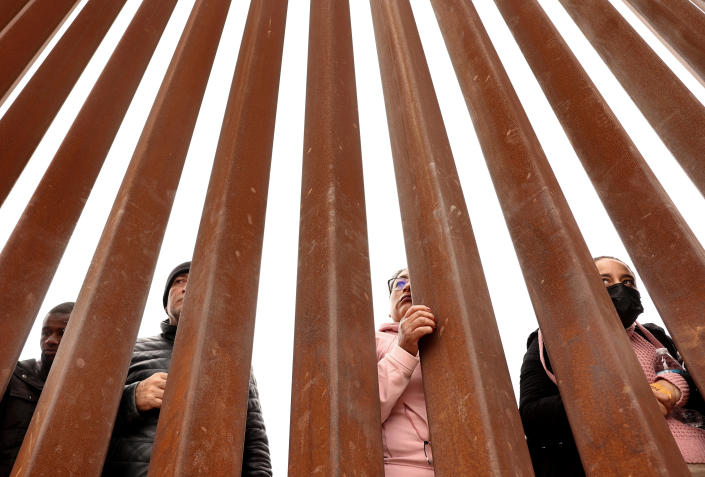Immigration advocates have said President Biden’s new border policy is a draconian restriction that will “effectively eliminate asylum” for most migrants. Republican officials in Texas, however, said the opposite was true, warning the settlement would trigger an “influx of migrants” with unverified asylum claims.
The two groups described the same Biden administration policy in separate lawsuits, but their reasons for challenging it were completely different.
Passed earlier this month, the Biden administrative rule disqualifies migrants from asylum if they have not first sought refuge in a third country before reaching the southern border of the United States. Those who cross the border illegally and do not prove they deserve an exemption from the rule face swift deportation and a five-year banishment from the United States.
The ruler is the centerpiece of administration wider effort to reduce illegal border crossings, which have recently reached record levels. It penalizes those who enter the country without permission, while expanding opportunities for migrants to come to the United States legally.
In their lawsuit earlier this month, the American Civil Liberties Union (ACLU) and other advocacy groups said Mr. Biden’s rule, like two Trump administrations asylum restrictions stranded in federal court, violates laws passed by Congress in 1980 to protect refugees fleeing persecution.
In a separate lawsuit filed this week, Republican Texas Attorney General Ken Paxton also argued the regulations were illegal, but he focused his criticism on a provision that orders migrants to wait in Mexico until what they get an appointment via a phone app to enter the United States. at an official border crossing. Those who enter the United States with one of the approximately 1,000 appointments distributed each day are not excluded from asylum.
The bedfellows’ bizarre lawsuits, both of which seek to block the asylum restriction in its entirety, could jeopardize Mr Biden’s strategy to manage migration to the US southern border, where Migrants are arriving in greater numbers and from more countries than ever before amid massive displacements in Latin America and the Caribbean. Federal judges in Oakland and Del Rio, Texas, could rule on those cases later this year, sparking a high-stakes legal battle that could reach the Supreme Court.

But beyond their legal and practical implications, the lawsuits illustrate the political thorny situation the Biden administration finds itself in when it comes to border policy.
Progressive advocates say Mr Biden has been too tough on migrants and too dependent on the deterrent policies adopted by former President Donald Trump. Republicans, meanwhile, continue to argue that the current migration crisis is one of Mr. Biden’s own decisions, accusing his administration of lax borders.
The lawsuits also highlight the dangers of crafting federal immigration policies amid decades of congressional inaction on the issue. Like his predecessors, Mr. Biden has largely exercised his executive authority to enact important immigration policies, on the southern border and inland. And like the unilateral shifts of his predecessors, Mr. Biden’s policy agenda has been challenged, and sometimes derailed, by lawsuits.
“Before you get to another administration, a court will strike down a rule or policy with an injunction and it needs to be changed immediately,” said Theresa Cardinal Brown, a former immigration official. America under former Presidents George W. Bush and Barack Obama. “It’s a whiplash effect on politics.”
A lawsuit in Texas, for example, blocked the Obama administration from granting work permits and deportation protections to unauthorized immigrants whose children were US citizens or permanent US residents. The Trump administration’s extensive asylum restrictions, migrant family separation policy and efforts to curtail legal immigration have faced dozens of often successful legal challenges from states ruled by Democrats and advocacy groups like the ACLU.
This trend has continued, if not intensified, under Mr. Biden. In his first two years in office, Texas and other Republican-led states convinced judges to block a 100-day moratorium on most deportations, rules limiting arrests by Immigration and Customs Enforcement (ICE) and the end of a Trump-era policy known as “Stay in Mexico” that forced asylum seekers to wait for their court dates outside the United States
Republican state officials have extended the termination of the Title 42 public health order — which allowed border agents to deport migrants without an asylum review — for another year. The pandemic rule only ended this month because the expiration of the national COVID-19 emergency overturned legal challenges.

More recently, a federal judge granted Florida’s request to halt a Biden administration’s migrant release policy that was intended to ease overcrowding inside Border Patrol facilities. Another Texas federal judge is also expected to rule soon on a request by Republican-led states to force the Biden administration to end the Deferred Action for Childhood Arrivals (DACA) program for 600,000 ‘dreamers’. immigrants.
Other cases remain unsolved, including Texas’ attempt to shut down a popular program which allows up to 30,000 Cubans, Haitians, Nicaraguans and Venezuelans with US-based financial sponsors to legally come to the country each month.
Cardinal Brown, now a senior adviser at the Bipartisan Policy Center, said the failure or unwillingness of Congress to change immigration law in any meaningful way since the 1990s has led states and groups to disagree with the administration in power to organize political battles in federal court. system.
“The main reason we are seeing these particular lawsuits by states is political and political difference of opinion,” Cardinal Brown said. “The judiciary is not meant to be a policy-making body, and we basically ask it to make policy.”
In a recent briefing, Blas Nuñez Neto, the top immigration and border policy official at the Department of Homeland Security, said the prosecutions “clearly demonstrate how fundamentally broken our immigration system is. “.
The administration, Nuñez Neto argued, is employing “innovative” executive measures to deter illegal border entries, which fell sharply after Title 42 expired on May 11. Asked by CBS News if the administration had a plan B or C to handle the border crossings if the lawsuits prevail, Nuñez Neto is pivoting to Congress.
“At the end of the day, we’re just aware that there’s no lasting solution here that doesn’t involve the US Congress,” he said.
Microsoft’s Brad Smith on a ‘genuine concern’ about China’s malware targeting infrastructure
What is the connection between hurricanes and climate change?
CBS premiere: South Carolina’s 5 ‘senator sisters’ criticize passage of 6-week abortion ban
